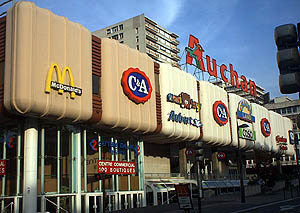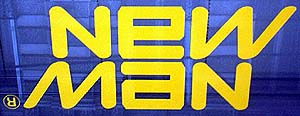Further north, it's Rue Président Wilson. Woodrow Wilson is fondly remembered here for bringing the U.S. to Europe's aid in WW I. In the U.S., he's mostly remembered for his 1916 reelection motto, "He kept us out of war."
The pictures are from Sunday morning at about 8:00 and Sunday evening at about 8:00. So, the stores are locked up, but at other times, the people, cars, and trams make it hard to photograph store fronts. The picture in the middle shows this section of the Grand'Rue from Le Panorama, a popular picnic spot in the hills to the south.
Surprise! No English here. While French doesn't use the apostrophe-S for possession, Scots does, as can be seen in the first stanza of Scots Wha Hae Wi' Wallace Bled. Therefore, the first word is obviously Scots. The second word is German. The third really is French. In the U.S., every time you see "restaurant", you see a French word that has slipped into English. It means "restoring" and a restaurateur (no N) means a restorer. Fast food is called restauration rapide and is generally not pejorative, but apparently this American company was afraid of the more-accurate term.

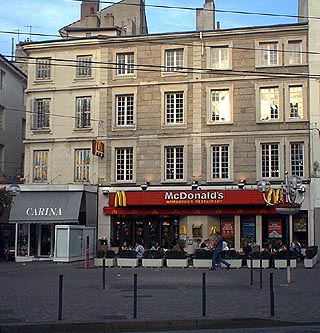
Here's an example of give-and-take: "If the English can take lingerie, then we can take Body One." Never mind that the name makes no sense in either language.
They also sell bathing suits, maillots de bain, except that the awning has a common mistake in forming the plural. The misplaced "s" doesn't change the pronunciation.
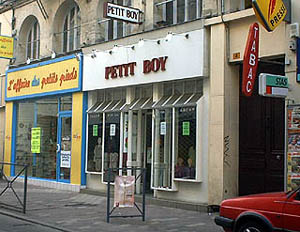
"Boy" is in no French dictionary. It's closest approximation is boyau, meaning "catgut" or "inner tube". I don't know why Petit Garçon wasn't good enough.
Next door is a tabac, a shop with tobacco, newspapers, candy, and maybe a bar counter. The word, presse, refers to "press" as in newspapers and magazines. Nearby is a pressing, a dry cleaner's. It's a French word now, like shampooing. Any word with the "ing" ending came from English (except poing, meaning "fist"). That's OK, because most English words with the equivalent "ant" ending came from French.
By the way, pression means beer on tap. If the dry cleaner gives you a beer, you're in the wrong shop.
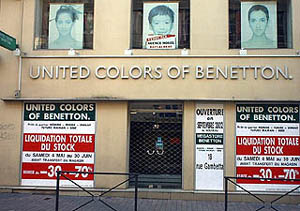
It's not surprising to see English when it's simply an internationally-recognized brand name. Everything else in the picture is French. A "Mégastore Benetton" will open in September. Mégastore, is an Anglicism that is not yet in dictionaries, but everyone knows what it means.
Noah Webster's spelling of "colors" makes it clear that this is an American company.
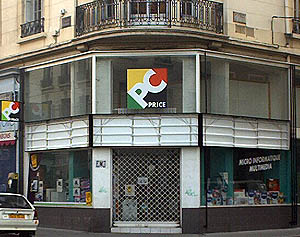
PC stands for Parti Communiste, the French Communist Party which is not extremist, but is dying out. But it's also in the dictionary (still pronounced pay-say) as a micro, the more common term for a microcomputer. "Price" is uniquely English and I don't know how this store name is pronounced, nor why "price" is an attractive English word. The French word for "price", prix, also means "prize", as in the now-English term, "grand prix racing".
The window says, "Micro Informatique Multimedia", all typical French found on a computer store.
Sac means sack, as in a lady's purse. I don't know why the uniquely-English word "Story" is used. The inexplicable apostrophe is common in store names that inexplicably use English.
English took "cul-de-sac" (bottom of the bag)from French, so this is another example inter-language give-and-take.
This might be an allusion to the very popular reality TV show in France called Loft Story.
With the tram tracks tight to the narrow sidewalk, this picture gives a clue to the narrowness of the "Grand'Rue". That's not really an irony. "Grande" means "important" or "tall", not necessarily "big". "Large" is the word for "wide", so it would be an irony only if it were called "Larg'Rue".
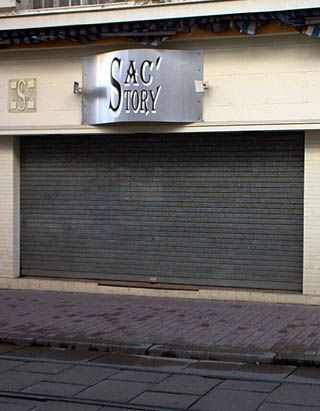
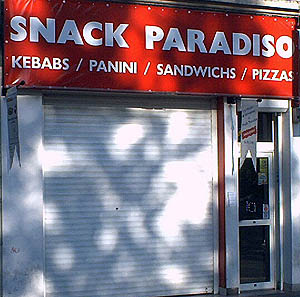
No traditional French words start with "sn". Snob and snobisme were borrowed from English a while back. In high school in 1972, I learned that the French pronunciation was "snub" except that snobs pronounced it "snob". Now there is snowboard and sniper as well as snack, which is common on storefronts.
The "sandwichs" spelling is the preferred plural for the now-French word "sandwich", but "-es" is also acceptable.
Kebab is the common French spelling for the Arabic word that is usually spelled "kabob" in English.
This is an English word that almost kept its French spelling from back when English was young. The French word is beauté. In the U.S., shops that sell beauty use lots of French. In this store, Martine seems to think that English connotes better beauty.
A driving school called "impact". It's no joke. The word is in every French dictionary with the meaning used in physics, a collision. Just as in English, it now has a non-standard meaning of "sudden strong influence". More important, the word in popular usage is used in advertising to mean "really really good". I've asked several people about this driving school and no one has thought that it's an intentional play on words. To double check, I asked if it was some kind of special driving school for people who had been in accidents. Such a school doesn't exist, I was assured.
There's technically not any English here, but it's comical for us Anglophones.
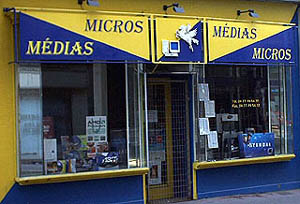
These are words that recently came from English, but they're French now. The words are a reminder that the U.S. invented microcomputers and is still dominant.
"Drink" is definitely English and Pub is an Anglicism from Great Britain where it is short for "Public House". In France, it is usually short for publicité (with a long "u") and means advertising. Still, it's not an uncommon word at drinking establishments, maybe to distinguish them from bars, where one might go just to have coffee. Grillon means the insect, "cricket". When you put it all together, I don't know what it means. The French word for the British game of cricket is le cricket, so I don't think there's an allusion to England here.
Some more English with an inexplicable apostrophe.
"Discount" is English. French has a good noun for discount, remise, but no good adjective as in "discount price".
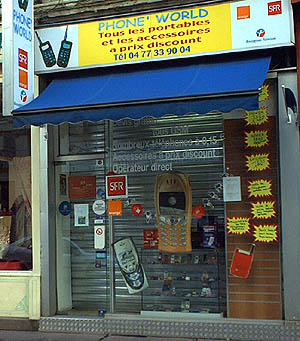
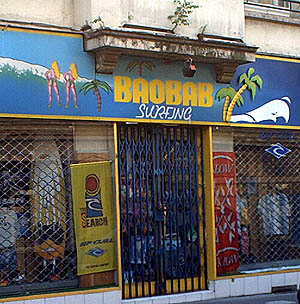
Surfing now has three meanings in French. There's still ocean surfing as in the stuff this store sells, it's also the Internet activity now. At the same time, snowboarders adopted the English gerund. There are advertisements for Internet access that show snowboarders and everyone understands the connection.
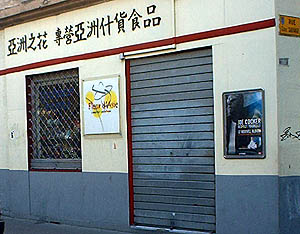
Just a reminder that English isn't the only foreign language seen.
Really, there are other foreign languages around. It's nonetheless notable that "La Bodega Café Bar Pub" manages to include three languages in 15 letters. I don't know what "Havana Club" means, but "club" is a common French word with the English meaning. In fact, it's been used in French since 1702, according to the big Pétit Robert dictionary at the University. During the French Revolution, there were political clubs. French and English have been sharing words continually, it turns out. It's not a recent American phenomenon.
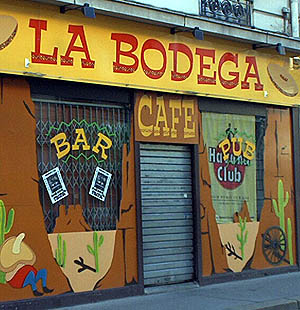
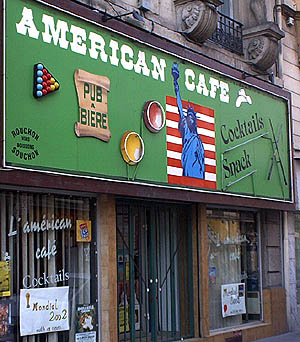
This is weird. You'll find every word here in a recent French dictionary, including cocktails. Ironically, the English word "cocktail" may be a corruption of a French word.
L'américan café is supposed to look English, instead of Le café américain. They discarded the "i" and put the adjective first, but couldn't let go of the accent nor did they use the English convention of capitalizing nationalities.
One would think they would say "BEER PUB" instead of the French PUB à BIERE. The problem may be with the French verb béer, meaning to open wide or gape. Since the accent is optional with capital letters, BEER PUB could look like an instruction to gape at the advertising. Then again, béer is described as "literary", so frequenters of this establishment are probably unfamiliar with the word.
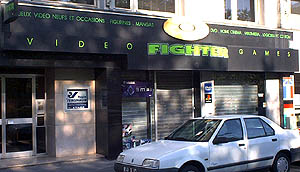
The small print says, "Jeux video neufs et occasions, figurines, mangas, DVD, home cinema, multimedia, logiciels PC CD-ROM".
The "ght" combination is not found in French, so "Fighter" is in-your-face English. "Manga" is the Japanese word (also used in English) for the distinctive Pokéman-style comic books.
Although "ght" is not found in French words, it's French in another way. If the you pronounce the individual letters in French, it comes out as "J'ai acheté", meaning "I bought".
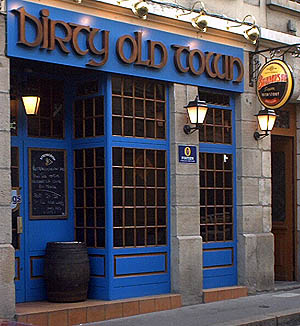
This tavern is just off on a side street. I've got to believe that only people who can't read English would go in. It seems to be an allusion to the Ewan MacColl song that was recorded by the Clancy Brothers, but I'm still not tempted to enter.
It's across from the Brasserie Le Norway. "Norway" is the English word for the country. It's Norvège in French and Norge in Norwegian.
Bizarre.
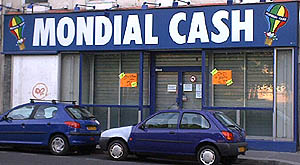
Besides "worldwide", mondial also means "super duper". (It also refers to the Soccer World Cup as on the sign in the window of the American Cafe above.) This is a used goods store that buys stuff, often from departing university students. I wonder if they're using the English word "cash" as an allusion to the U.S. to invoke the stereotype of free-flowing money.
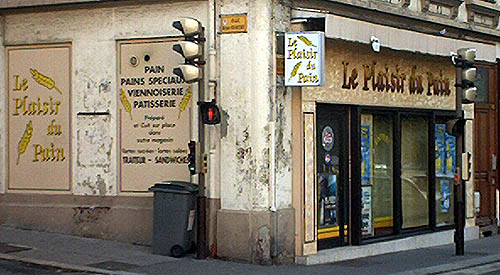 Le
Plaisir du Pain
Le
Plaisir du PainAs we come to the end of our walk, it's good to remember that some business names are pure French and you mustn't look for English where it isn't hiding. This store is "The Pleasure of Bread". That's all. The only activity in the back room is bread baking.
